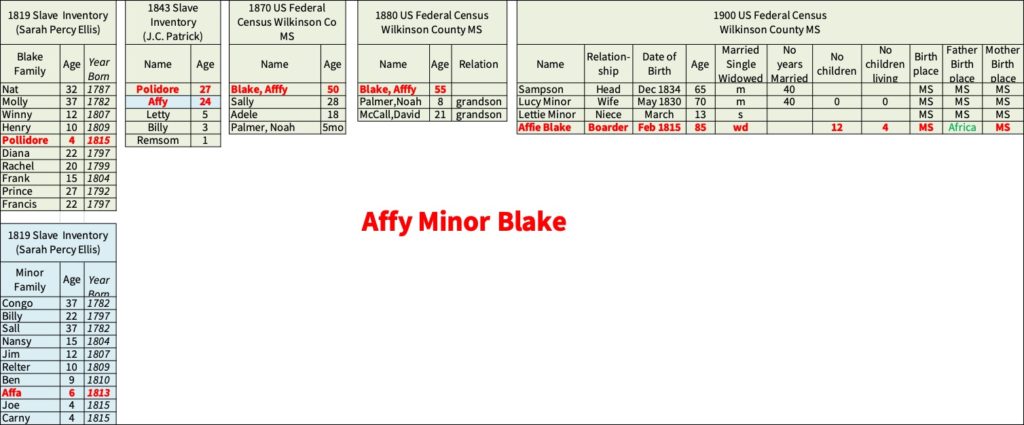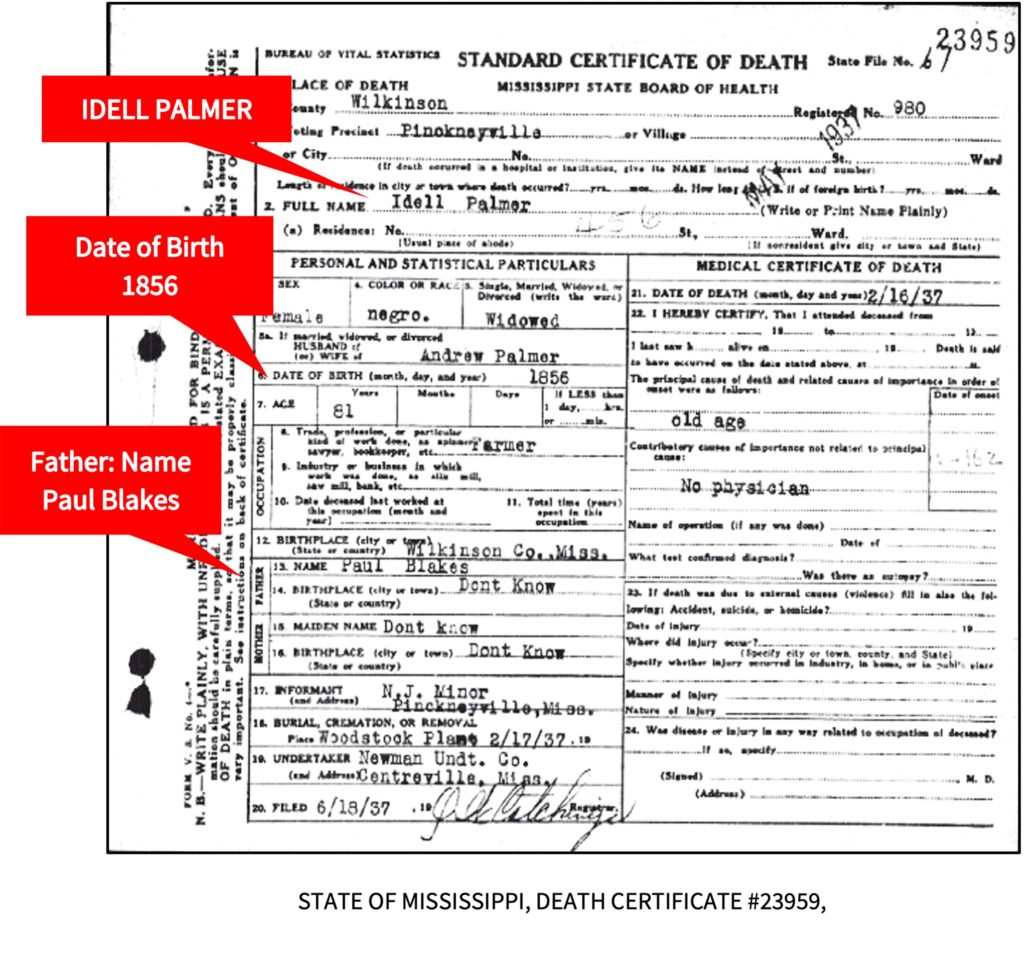Affy Minor Blake was born around 1815 and died between 1900 and 1910. Her parents, Congo and Sall, and their children, arrived on Edgefield Plantation in Woodville, Mississippi, in 1815. The family was enslaved by John Ellis of Natchez and, after his death in 1808, were given to his wife Sarah Percy Ellis in the division of his estate (see Natchez Black Families Arrive On Edgefield). Stephen Minor, of Natchez, was believed to be the original slaveholder of the Minor Family. Edgefield family historian Samuel Booker Minor told me he spent “a lot of money” looking for the origins of the Minors in Natchez. Congo Minor’s birthplace is listed as Africa on the 1900 census where Affy is in the household of her nephew Sampson Minor, son of her brother Jimmy Minor.
Affy was the wife of Polidore Blake. Together they had 12 children in Woodville. Their first child Letty is 6 years old in the 1843 J.C. Patrick slave inventory, so they started their family together in around 1837 in Woodville. Polidore, the brother of my great-great grandfather Henry Blake, was born on Edgefield in around 1815 to Nat Blake, born in 1787, and Molly, born in 1782. Polidore does not appear on the 1870 census, and likely died in slavery after the birth of Adele around 1856.
Adele, shown with her mother Affy Blake on the 1870 census died in 1937 at the age of 81. On the death certificate of Idell (Adele) Blake Palmer, who married Andrew Palmer, her date of birth is recorded as 1856. Her father’s name, given by the informant N.J. Minor, is Paul Blakes (Paul or Pol is a shortened name for Polidore). The “maiden name” of her mother [i.e.Affy Minor] was listed as unknown.

In my 1998 interview with Samuel Booker Minor I asked him who was Affy Blake, a name I saw on the 1880 census among my other Edgefield family names but had never heard anyone in the family talk about. This may have been the first time in many years he heard the name Affy Blake. He was so excited to hear her name again and tell me about her.
Samuel Booker Minor (1904-2001)
“Yeah, I know about Aunt Affy. Yeah, Aunt Affy.
They tell me she sank all these here springs cleaning them out. You see, people didn’t have cisterns and wells and things then. They had to go miles to a spring to get water in the woods. Aunt Affy, she’d clean them out. And they tell me that a woman menstruating, and [if] she would fool with a spring like that it would sink.
Did they have a spring over on y’all’s place called Grand Jenny? Did you hear Cousin Henry [Blakes] and them talking about it? He dug the cistern there but I’m talking about the natural slave spring. They over here in the Quarters right up there and the spring [is] down there and Affy sunk it and it moved down here, so they had to dig a well there.
And they put boards up and Papa Pharoah had a little grandboy there, his name was William. And that boy would get on them things and go down to the bottom. Just like [if] the buckets drop off or something and he’d go down there and get it. The last time I knew anything about this spring they had a great big iron pipe and it had a little bottom in it and they dug down there to where they had these here boards, you know, running a well. And they had that spring down there and they could cut a hole up here where they could let the bucket down there and draw the water up out of there. I reckon it’s there now, up by the Quarters now. I don’t know how it is down there [now] but that’s where we used to drink. When Mama’s children moved here and she didn’t have water we had cool water then. We could see down there and the water was clear.
Water run out of a bank or something and see the trees… the worms would drop leaves, the leaves out of them trees could drop down in there and she [Affy] would be there cleaning them out, they tell me, cleaning the spring out to give it a free run.
Yeah, Aunt Affy… Grand Jenny… All of them was ahead of me.”
[Alvin Blakes interview with Samuel Booker Minor, December 26, 1998]

Samuel Booker Minor was too young to have known Affy Blake personally. He was careful to always say, they tell me, when retelling the stories he had been told about her. It is not entirely clear how far these stories of Affy Blake go back in time but the “Quarters” he is referring to are the former Edgefield Plantation slave cabins where 260 enslaved people lived in 53 cabins in 1860. Affy Blake was already around 50 years old when Emancipation came in 1865 so these are likely slavery era stories that have been passed down.
Carrying drinking water from underground “natural slave springs” located miles in the woods from the Edgefield “Quarters” brings to my mind people in West African villages, mostly women and children, walking miles to rivers and streams to carry clean water in buckets on top of their heads. The belief that there were certain “powers” attributed to a women’s menstrual flow, along with the belief that Sampson Minor could pray and stop the flooding rains, are now a part of the family lore of Edgefield.
The story of Affy Blake tells us a lot more about what life was like in slavery days. She had 12 children, only four were still living in 1900. Her connection to the community supply of life-giving natural spring water was remembered and passed down by her descendants. She was enslaved for 52 years on the Edgefield plantation before Emancipation in 1865 and lived to be around 90-years old, and now her story will always be remembered.

Next: Black Families of Edgefield Plantation: The Growth of Human Capital, Labor & Wealth In Woodville, Mississippi, 1776-1865

Even though memories are not history, they often point the way and supply otherwise unknown details to our ancestors stories.
Kristin, thanks for your comment. These memories, and especially the way the stories were told to me, are revealing many things about the everyday life of my ancestors. It has taken me years to really begin to understand the function and power of memory.
Pertaining to memory, my person recall how many whites working in history field of educating, interpreting, presentation consistently discounted the interview enslaved Africans descendants narratives as being of less value to historical “accuracy!”
My person approached the narratives from a truth science approach in order to determine historical accuracy. This means development of a matrix system that reflects repetition of or similarity repetition of terms, situations, events, behaviors, conditions, happenings, ways, stories, etc.
In this way, my person was able to see enslaved people seeking freedom in ways other than the flight up northward from the Deep South, was able to kill the standing history folks statements that once sold down the river, enslaves could not escape to freedom because they didn’t know the land of the new region, that runaway enslaves were poorly dressed, didn’t have money, were mostly field hands, were not aged, were mostly males and much more. The enslaves
Thank you again for your insight.
Thank you for sharing all of this history of life in the very early days of what became Wilkinson County, Mississippi. This information really shows how the area was settled and gives historical information that was not taught in the public schools.
Many of the surnames are names that are very familiar and many of the families are very familiar, I did not know their origin. I an researching the Bunch, Welch, Knight, Brannon family genealogy.
Thank you for documenting Samuel Booker Minor’s memory of your Ancestor, Affy. I can almost see his face light up in his telling the story. The memories, ours or those of others, add “flavor” to our family history research.
Thank you for reading and commenting.
Yes, thank you for continuing to share your stories. They are an inspiration to us.
Thanks Brenda.
Alvin, I always get misty-eyed when I read your stories. Your words flow in such a way that I can feel the urgency and weight of the time period and your ancestors’ lived experiences. I certainly appreciate as Samuel did too, that you called the name, “AFFY,” which had not been heard in many years. Now, AFFY has a voice again. Thank you for your continued dedication to sharing how your family is woven into American History.
Vernita. As always, thanks for your support.
Great read Alvin. Thanks for sharing. I just 2 months ago found my ancestor in a will, at the age of 8 valued at $350. Also I think I was able to identify her parents…unconfirmed as of yet.
Again I applaud your research skills.
Thanks Howard.